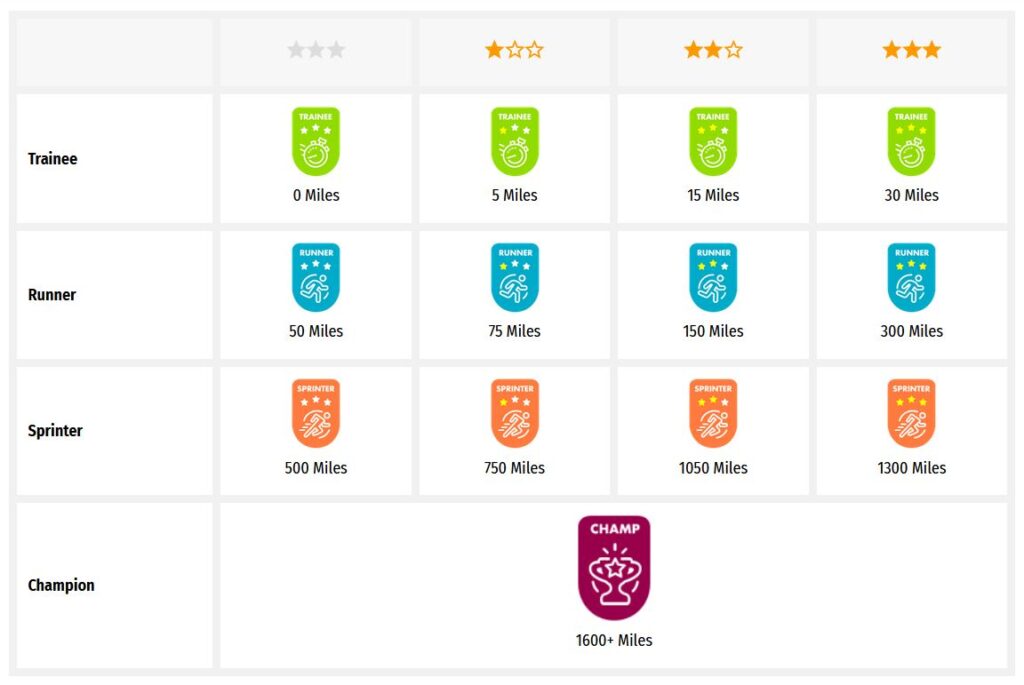Someone else is currently editing this document
Only one person can work on a document at a time
William Reginald Harold Brown (M.C.) Item 34
TRANSCRIPTION
however, reported as absentees, and our names were sent to the guard-room. This was a fine state of things! But we wxplained the reason for our absence to our Platoon Commander, and he soon put the matter right.
Six of us who had been great friends throughout the course held a farewell dinner amongst ourselves, and returned to camp after hours, without leave. Unfortunately, the Adjtant, in tennis flannels, entered the Park at the same time as we did, and sent us all to the guard-room. Next morning our Comapny Commander severely reprimanded us and threatened to return us all to our battalions. The Colonel, however, before whom such a case must be tried, had referred to our conduct-sheets and, having found them all beyond approach, instructed our Comapny Commander to dismiss us. I began to think I should be lucky if I got my commission; but as the War Office examination came off two days later, I managed to keep clear. I passed the test in June, and was duly gazetted a Second Lieutenant. Then followed a further monyh's leave. On my way home I stayed in Dublin for a week-end, and saw the damage done in the 1916 Rebellion, in which Sackville Street suffered severely.
CHAPTER NINETEEN
At the end of July, 1918, I joined my new Regiment, the 34d Nattalion SOmerset L.I., at Palace Barrack, Holywood, near Belfast. I was instructed to travel via Liverpool, but on arrival at the Docks I learned that the Irish boat had gone and there would not be another for two days. As I could not afford this delay, I hurried back to the station, caught a train to Fleetwood, and was lucly enough to find a boat was leaving for Belfast in a few hours. I therefore went aboard, booked a cabin, and, after an hour on deck for a pleasant soke, turned in and slept till seven o'clock next morning. I then took train for the few miles to Holywood, and reached Barracks about eleven o'clock. Here I was sent to duty in less than an hour, before being shown my quarters.
At Holywood I met Sec.-Lieut. Jenkins, who became my best officer friend. He was drafted to France soon after my arrival, however, and I lost touch with him for the time being. I had a revolver course, a Lewis-gun course, etc., with the Battalion, and a pleasant four-days' anti-gas course at the Area School at Clandeboye. While on this course I stayed at the Imperial Hotel, in Banglor, a small seaside resort at the end of belfast Lough. At the tnd of my course I obtained leave of absence for 48 hyours, and greatly enjoyed myself with three other officers. Twice during my stay in Belfast I was sent to Ballykinlar with a party of recruits for field firing, and on my second trip I crossed Dundrum Bay and ran over to Newdcastle - a tiny town at the foot o the Mourne Mountains - and had the good fortune to climb to the top of Slieve Donard, about 2,900 feet high. This peak rises practically from the water's edge and commands a most magnificent view. I much enjoyed this trip, as it was my first experience on a mountain. This was on a Saturday. On the following day I received a telegram ordering my return to Holywood by the first train on monday, as I was to proceed overseas. On monday evening I left Belfast and trturned to oxford, via Larne and Stranraer, for my final leave.
Language(s) of Transcription
LOCATION
ABOUT THIS DOCUMENT
Document Date
Document Type
Document Description
Language of Description
Keywords
External Web Resources
People
STORY INFORMATION
Title
William Reginald Harold Brown (M.C.)
Creator
William Reginald Harold Brown
Source
UGC
Contributor
europeana19141918:agent/f6312eff918d7b4be949982bd4e7254a
Date
1910
1919-05-01
Type
Story
Language
eng
English
Country
Europe
DataProvider
Europeana 1914-1918
Provider
Europeana 1914-1918
Rights
http://creativecommons.org/publicdomain/zero/1.0/ http://creativecommons.org/licenses/by-sa/3.0/Year
1910
DatasetName
2020601_Ag_ErsterWeltkrieg_EU
Begin
1910
End
1919-05-01
Language
mul
Agent
William Reginald Harold Brown | europeana19141918:agent/a367e3caa7b6950ef4efd6eab57346ad
Raymond Andrew Barson | europeana19141918:agent/f6312eff918d7b4be949982bd4e7254a
Created
2019-09-11T08:49:01.249Z
2020-02-25T08:58:40.146Z
2017-02-13 13:29:54 UTC
2017-02-13 13:32:16 UTC
Provenance
OX2016
Story Description
Diary (45 pages, pdf format). Self-published after the war. Covers the period December 1910 - August 1914 (brief) and in more detail from August 1914 to 1 May 1919.William Reginald Harold Brown (M.C.) was born in Oxford. He lived in Botley Road and then Abbey Road and then the family moved to Hillview Road. He joined the Territorial Army when he was 17.5 years old. Before the War he worked at Oxford Times as a printer, then joined the Oxfordshire and Buckinghamshire Light Infantry before the Somerset Light Infantry. He has described his war experience in his memoirs, which he printed himself (being a printer). The document includes the story of how he was awarded the M.C. During a stint in Somerset Light Infantry, he was leading group of 3-4 men forwards when they stumbled upon a German machine gun post. Under fire he dragged one of his men back 100 yards under fire. A shell blast in the War made him deaf. He wasn’t invalided out but was in until the end but he couldn’t work with machines afterwards, so he changed jobs to be a proof reader. He had a big ear trumpet that his grand-son remembers - would shout into it to get him to hear. He retired before WWII, quite young, thanks to his war pension. The family had several houses and had an income from rent. His mother didn’t like the idea of him cycling around the Plain. He was from Morrell Avenue off the bottom of Headington Hill by South Park. Newspaper and printers used to be a New Inn Hall, Shoe Lane. He was married to a woman whose maiden name was Rogers. They were the maternal grandparents of the contributor. When Mr Brown died, of old age, the only known existing copy of his memoirs was his own; not certain if he had given it to other people. There are no changes/margin notes. (This story and material was shared at the Oxford at War 1914-1918 Roadshow on 12 Nov 2016)Descriptive diary covering the period Dec 1910 - Aug 1914 (briefl) and Aug 1914 - 1 May 1919.Diary
TRANSCRIPTION
LOCATION
DESCRIPTION
PEOPLE
STORY INFO
TUTORIAL
however, reported as absentees, and our names were sent to the guard-room. This was a fine state of things! But we wxplained the reason for our absence to our Platoon Commander, and he soon put the matter right.
Six of us who had been great friends throughout the course held a farewell dinner amongst ourselves, and returned to camp after hours, without leave. Unfortunately, the Adjtant, in tennis flannels, entered the Park at the same time as we did, and sent us all to the guard-room. Next morning our Comapny Commander severely reprimanded us and threatened to return us all to our battalions. The Colonel, however, before whom such a case must be tried, had referred to our conduct-sheets and, having found them all beyond approach, instructed our Comapny Commander to dismiss us. I began to think I should be lucky if I got my commission; but as the War Office examination came off two days later, I managed to keep clear. I passed the test in June, and was duly gazetted a Second Lieutenant. Then followed a further monyh's leave. On my way home I stayed in Dublin for a week-end, and saw the damage done in the 1916 Rebellion, in which Sackville Street suffered severely.
CHAPTER NINETEEN
At the end of July, 1918, I joined my new Regiment, the 34d Nattalion SOmerset L.I., at Palace Barrack, Holywood, near Belfast. I was instructed to travel via Liverpool, but on arrival at the Docks I learned that the Irish boat had gone and there would not be another for two days. As I could not afford this delay, I hurried back to the station, caught a train to Fleetwood, and was lucly enough to find a boat was leaving for Belfast in a few hours. I therefore went aboard, booked a cabin, and, after an hour on deck for a pleasant soke, turned in and slept till seven o'clock next morning. I then took train for the few miles to Holywood, and reached Barracks about eleven o'clock. Here I was sent to duty in less than an hour, before being shown my quarters.
At Holywood I met Sec.-Lieut. Jenkins, who became my best officer friend. He was drafted to France soon after my arrival, however, and I lost touch with him for the time being. I had a revolver course, a Lewis-gun course, etc., with the Battalion, and a pleasant four-days' anti-gas course at the Area School at Clandeboye. While on this course I stayed at the Imperial Hotel, in Banglor, a small seaside resort at the end of belfast Lough. At the tnd of my course I obtained leave of absence for 48 hyours, and greatly enjoyed myself with three other officers. Twice during my stay in Belfast I was sent to Ballykinlar with a party of recruits for field firing, and on my second trip I crossed Dundrum Bay and ran over to Newdcastle - a tiny town at the foot o the Mourne Mountains - and had the good fortune to climb to the top of Slieve Donard, about 2,900 feet high. This peak rises practically from the water's edge and commands a most magnificent view. I much enjoyed this trip, as it was my first experience on a mountain. This was on a Saturday. On the following day I received a telegram ordering my return to Holywood by the first train on monday, as I was to proceed overseas. On monday evening I left Belfast and trturned to oxford, via Larne and Stranraer, for my final leave.
- English (English)
however, reported as absentees, and our names were sent to the guard-room. This was a fine state of things! But we wxplained the reason for our absence to our Platoon Commander, and he soon put the matter right.
Six of us who had been great friends throughout the course held a farewell dinner amongst ourselves, and returned to camp after hours, without leave. Unfortunately, the Adjtant, in tennis flannels, entered the Park at the same time as we did, and sent us all to the guard-room. Next morning our Comapny Commander severely reprimanded us and threatened to return us all to our battalions. The Colonel, however, before whom such a case must be tried, had referred to our conduct-sheets and, having found them all beyond approach, instructed our Comapny Commander to dismiss us. I began to think I should be lucky if I got my commission; but as the War Office examination came off two days later, I managed to keep clear. I passed the test in June, and was duly gazetted a Second Lieutenant. Then followed a further monyh's leave. On my way home I stayed in Dublin for a week-end, and saw the damage done in the 1916 Rebellion, in which Sackville Street suffered severely.
CHAPTER NINETEEN
At the end of July, 1918, I joined my new Regiment, the 34d Nattalion SOmerset L.I., at Palace Barrack, Holywood, near Belfast. I was instructed to travel via Liverpool, but on arrival at the Docks I learned that the Irish boat had gone and there would not be another for two days. As I could not afford this delay, I hurried back to the station, caught a train to Fleetwood, and was lucly enough to find a boat was leaving for Belfast in a few hours. I therefore went aboard, booked a cabin, and, after an hour on deck for a pleasant soke, turned in and slept till seven o'clock next morning. I then took train for the few miles to Holywood, and reached Barracks about eleven o'clock. Here I was sent to duty in less than an hour, before being shown my quarters.
At Holywood I met Sec.-Lieut. Jenkins, who became my best officer friend. He was drafted to France soon after my arrival, however, and I lost touch with him for the time being. I had a revolver course, a Lewis-gun course, etc., with the Battalion, and a pleasant four-days' anti-gas course at the Area School at Clandeboye. While on this course I stayed at the Imperial Hotel, in Banglor, a small seaside resort at the end of belfast Lough. At the tnd of my course I obtained leave of absence for 48 hyours, and greatly enjoyed myself with three other officers. Twice during my stay in Belfast I was sent to Ballykinlar with a party of recruits for field firing, and on my second trip I crossed Dundrum Bay and ran over to Newdcastle - a tiny town at the foot o the Mourne Mountains - and had the good fortune to climb to the top of Slieve Donard, about 2,900 feet high. This peak rises practically from the water's edge and commands a most magnificent view. I much enjoyed this trip, as it was my first experience on a mountain. This was on a Saturday. On the following day I received a telegram ordering my return to Holywood by the first train on monday, as I was to proceed overseas. On monday evening I left Belfast and trturned to oxford, via Larne and Stranraer, for my final leave.
Language(s) of Transcription
English Translation
Transcription History
however, reported as absentees, and our names were sent to the guard-room. This was a fine state of things! But we wxplained the reason for our absence to our Platoon Commander, and he soon put the matter right. Six of us who had been great friends throughout the course held a farewell dinner amongst ourselves, and returned to camp after hours, without leave. Unfortunately, the Adjtant, in tennis flannels, entered the Park at the same time as we did, and sent us all to the guard-room. Next morning our Comapny Commander severely reprimanded us and threatened to return us all to our battalions. The Colonel, however, before whom such a case must be tried, had referred to our conduct-sheets and, having found them all beyond approach, instructed our Comapny Commander to dismiss us. I began to think I should be lucky if I got my commission; but as the War Office examination came off two days later, I managed to keep clear. I passed the test in June, and was duly gazetted a Second Lieutenant. Then followed a further monyh's leave. On my way home I stayed in Dublin for a week-end, and saw the damage done in the 1916 Rebellion, in which Sackville Street suffered severely. CHAPTER NINETEEN At the end of July, 1918, I joined my new Regiment, the 34d Nattalion SOmerset L.I., at Palace Barrack, Holywood, near Belfast. I was instructed to travel via Liverpool, but on arrival at the Docks I learned that the Irish boat had gone and there would not be another for two days. As I could not afford this delay, I hurried back to the station, caught a train to Fleetwood, and was lucly enough to find a boat was leaving for Belfast in a few hours. I therefore went aboard, booked a cabin, and, after an hour on deck for a pleasant soke, turned in and slept till seven o'clock next morning. I then took train for the few miles to Holywood, and reached Barracks about eleven o'clock. Here I was sent to duty in less than an hour, before being shown my quarters. At Holywood I met Sec.-Lieut. Jenkins, who became my best officer friend. He was drafted to France soon after my arrival, however, and I lost touch with him for the time being. I had a revolver course, a Lewis-gun course, etc., with the Battalion, and a pleasant four-days' anti-gas course at the Area School at Clandeboye. While on this course I stayed at the Imperial Hotel, in Banglor, a small seaside resort at the end of belfast Lough. At the tnd of my course I obtained leave of absence for 48 hyours, and greatly enjoyed myself with three other officers. Twice during my stay in Belfast I was sent to Ballykinlar with a party of recruits for field firing, and on my second trip I crossed Dundrum Bay and ran over to Newdcastle - a tiny town at the foot o the Mourne Mountains - and had the good fortune to climb to the top of Slieve Donard, about 2,900 feet high. This peak rises practically from the water's edge and commands a most magnificent view. I much enjoyed this trip, as it was my first experience on a mountain. This was on a Saturday. On the following day I received a telegram ordering my return to Holywood by the first train on monday, as I was to proceed overseas. On monday evening I left Belfast and trturned to oxford, via Larne and Stranraer, for my final leave.
however, reported as absentees, and our names were sent to the guard-room. This was a fine state of things! But we wxplained the reason for our absence to our Platoon Commander, and he soon put the matter right. Six of us who had been great friends throughout the course held a farewell dinner amongst ourselves, and returned to camp after hours, without leave. Unfortunately, the Adjtant, in tennis flannels, entered the Park at the same time as we did, and sent us all to the guard-room. Next morning our Comapny Commander severely reprimanded us and threatened to return us all to our battalions. The Colonel, however, before whom such a case must be tried, had referred to our conduct-sheets and, having found them all beyond approach, instructed our Comapny Commander to dismiss us. I began to think I should be lucky if I got my commission; but as the War Office examination came off two days later, I managed to keep clear. I passed the test in June, and was duly gazetted a Second Lieutenant. Then followed a further monyh's leave. On my way home I stayed in Dublin for a week-end, and saw the damage done in the 1916 Rebellion, in which Sackville Street suffered severely. CHAPTER NINETEEN At the end of July, 1918, I joined my new Regiment, the 34d Nattalion SOmerset L.I., at Palace Barrack, Holywood, near Belfast. I was instructed to travel via Liverpool, but on arrival at the Docks I learned that the Irish boat had gone and there would not be another for two days. As I could not afford this delay, I hurried back to the station, caught a train to Fleetwood, and was lucly enough to find a boat was leaving for Belfast in a few hours. I therefore went aboard, booked a cabin, and, after an hour on deck for a pleasant soke, turned in and slept till seven o'clock next morning. I then took train for the few miles to Holywood, and reached Barracks about eleven o'clock. Here I was sent to duty in less than an hour, before being shown my quarters. At Holywood I met Sec.-Lieut. Jenkins, who became my best officer friend. He was drafted to France soon after my arrival, however, and I lost touch
however, reported as absentees, and our names were sent to the guard-room. This was a fine state of things! But we wxplained the reason for our absence to our Platoon Commander, and he soon put the matter right. Six of us who had been great friends throughout the course held a farewell dinner amongst ourselves, and returned to camp after hours, without leave. Unfortunately, the Adjtant, in tennis flannels, entered the Park at the same time as we did, and sent us all to the guard-room. Next morning our Comapny Commander severely reprimanded us and threatened to return us all to our battalions. The Colonel, however, before whom such a case must be tried, had referred to our conduct-sheets and, having found them all beyond approach, instructed our Comapny Commander to dismiss us. I began to think I should be lucky if I got my commission; but as the War Office examination came off two days later, I managed to keep clear. I passed the test in June, and was duly gazetted a Second Lieutenant. Then followed a further monyh's leave. On my way home I stayed in Dublin for a week-end, and saw the damage done in the 1916 Rebellion, in which Sackville Street suffered severely. CHAPTER NINETEEN At the end of July, 1918, I joined my new Regiment, the 34d Nattalion SOmerset L.I., at Palace Barrack, Holywood, near Belfast. I was instructed to travel via Liverpool, but on arrival at the Docks I learned that the Irish boat had gone and there would not be another for two days. As I could not afford this delay, I hurried back to the station, caught a train to Fleetwood, and was lucly enough to find a boat was leaving for Belfast in a few hours. I therefore went aboard, booked a cabin, and, after an hour on deck for a pleasant soke, turned in and slept till seven o'clock next morning. I then took train for the few miles to Holywood, and reached Barracks about eleven o'clock. Here I was sent to duty in less than an hour, before being shown my quarters.
however, reported as absentees, and our names were sent to the guard-room. This was a fine state of things! But we wxplained the reason for our absence to our Platoon Commander, and he soon put the matter right. Six of us who had been great friends throughout the course held a farewell dinner amongst ourselves, and returned to camp after hours, without leave. Unfortunately, the Adjtant, in tennis flannels, entered the Park at the same time as we did, and sent us all to the guard-room. Next morning our Comapny Commander severely reprimanded us and threatened to return us all to our battalions. The Colonel, however, before whom such a case must be tried, had referred to our conduct-sheets and, having found them all beyond approach, instructed our Comapny Commander to dismiss us. I began to think I should be lucky if I got my commission; but as the War Office examination came off two days later, I managed to keep clear. I passed the test in June, and was duly gazetted a Second Lieutenant. Then followed a further monyh's leave. On my way home I stayed in Dublin for a week-end, and saw the damage done in the 1916 Rebellion, in which Sackville Street suffered severely.
English Translation
Automatically Identified Enrichments
Verify Automatically Identified Enrichments
Verify Automatically Identified Locations
Verify Automatically Identified Persons
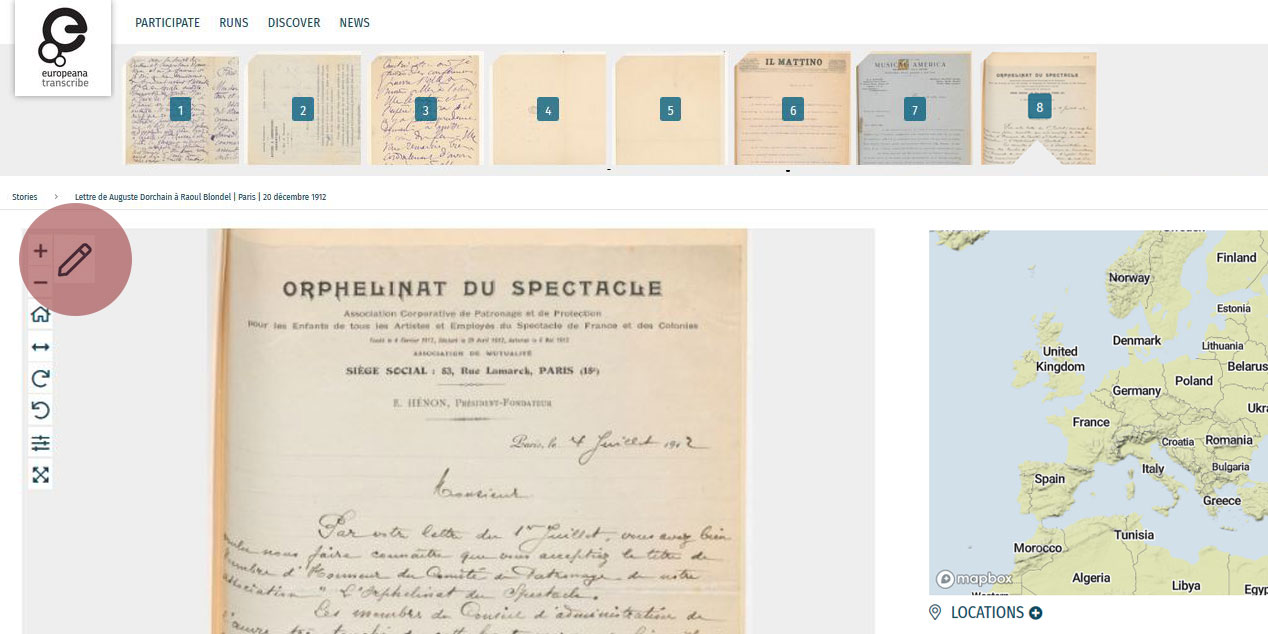
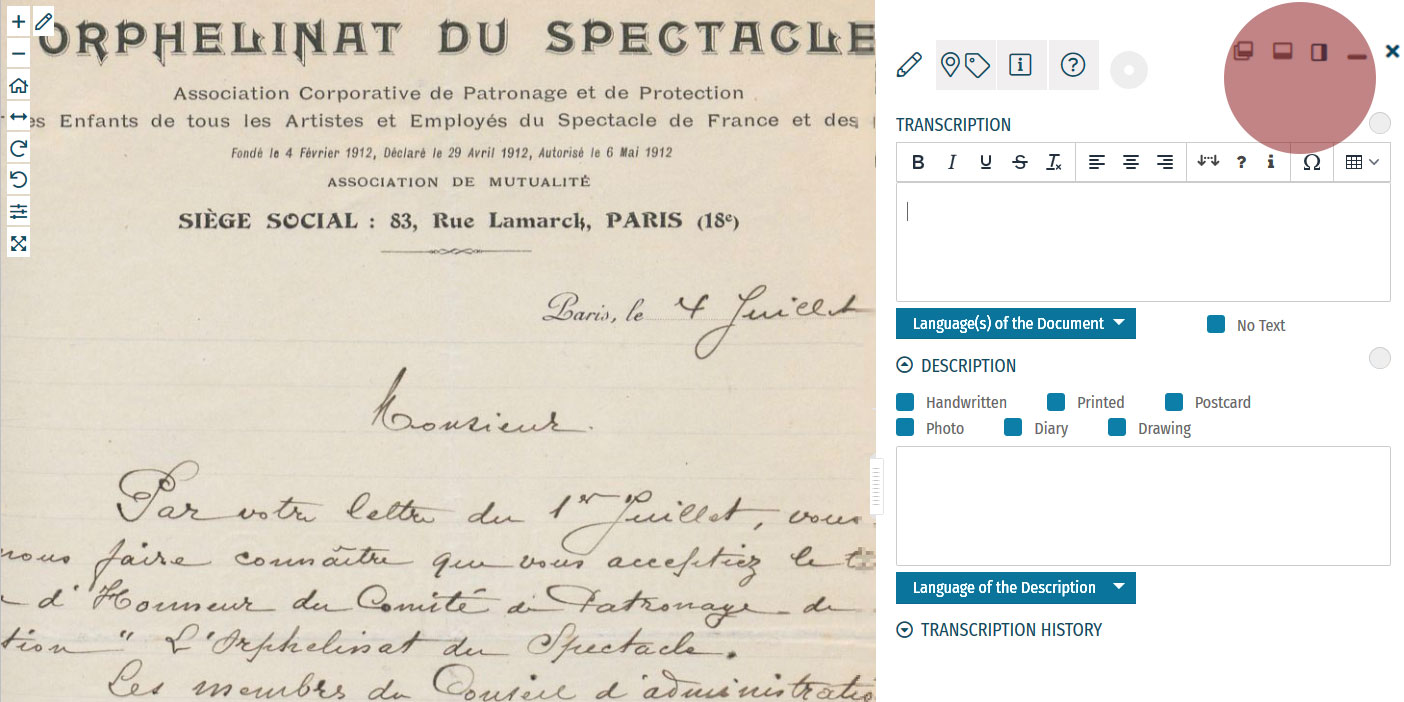
Enrichment Mode
Edit your workspace view by using the top-right menu.
You can have the white Activity Panel docked to the right (default) , to the bottom , or as an independent overlay . If you just want to view the image, you can hide the panel using the minimise button , and then re-open it with the pen button. Adjust the size and position of your Activity Panel according to your preferences.
You enrich documents by following a step-by-step process.
Make sure you regularly save your enrichments in each step to avoid the risk of losing your work.
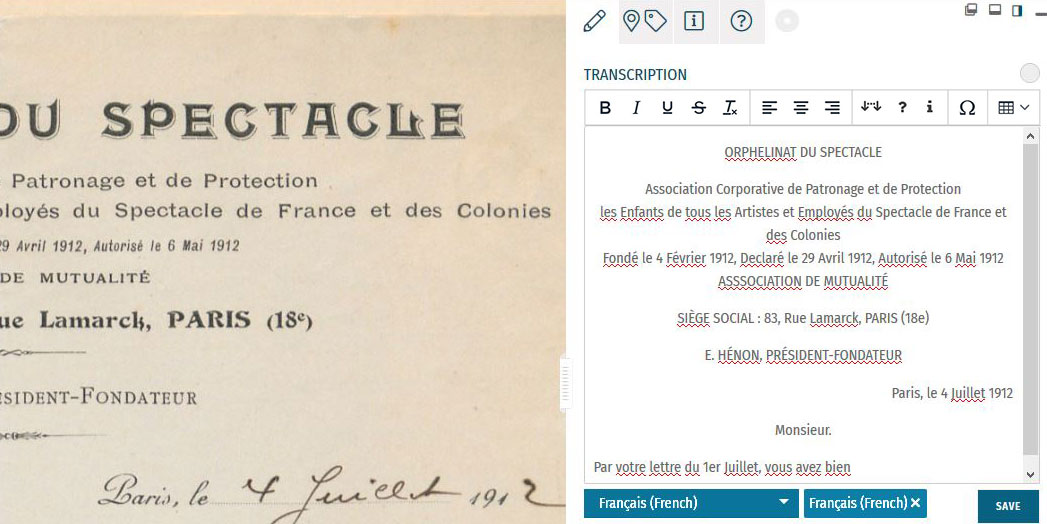
Step 1: Transcription
To start a transcription, select the transcription tab at the top menu of the Activity Panel. Click inside the box underneath the heading TRANSCRIPTION and start writing your transcription. When needed, use the toolbar to format your text and to add special characters and tables. A guide to the transcription toolbar is available in the Formatting section of this tutorial.
Identify the language(s) of the text using the dropdown list under the transcription box. You can select multiple languages at once.
If the item has no text to transcribe, tick the checkbox ‘No Text’.
Once you have finished your transcription, click SAVE.
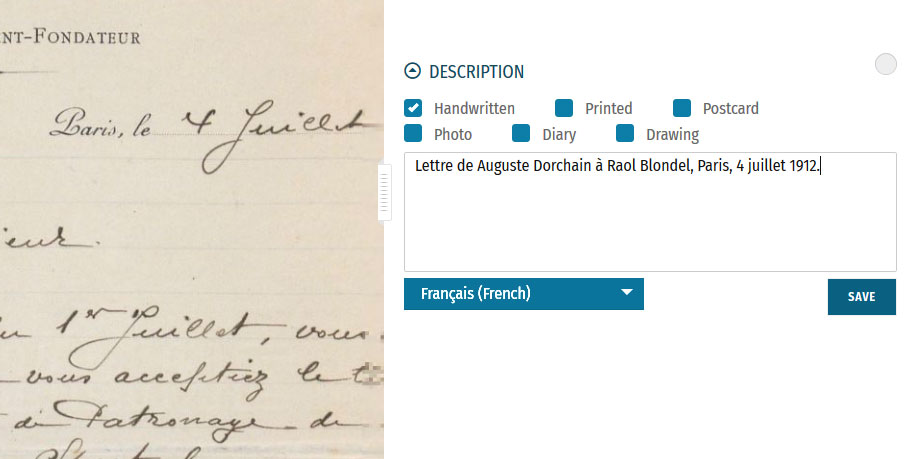
Step 2: Description
You can add a description to the item underneath the Transcription section.
The first task is to identify what type of document the item is: a handwritten or printed document, a postcard, photo, drawing and/or part of a diary. Tick the category which best applies to the item. Multiple categories can be selected at once.
The second task is to write a description of the contents. Click inside the box underneath the heading DESCRIPTION. Here, you can write what the item is, what it is about, and specify the images and objects that appear in the item.
Identify the language of the description text that you wrote using the dropdown list underneath. You can only select one language.
Once you have finished your description, click SAVE.

Step 3: Location
If you find a location mentioned or recognise a place in the item, you can create a geotag and pin it to the item map. Multiple locations can be attached to the item. To tag locations, select the tagging tab at the top menu of the Activity Panel. Click the plus next to the heading LOCATIONS. Type the location into the search bar and select the result that best applies. A new pin will be placed into the map. The location name should be a clear georeference, e.g. a country, city or address. Make adjustments to the location name if necessary. You can also adjust the position of the pin by dragging it on the map. If you want to add further details to the location, you can write a (short) description. This could include extra information about the geotag (e.g. the building name or a significant event that took place at the location) or the relevance of the place to the item (e.g. the hometown of the author). You can also add a Wikidata reference to link the location to a stable source. Search for the reference using the Wikidata fields. Once you have finished your location tag, click SAVE. You can find the place(s) tagged to the item in grey at the bottom of the Location(s) section.Step 4: Tagging
Below the Locations section is the Tagging section, where you can add the following annotations:
 Document Date:
Document Date:Here, you can add dates that correspond to the item. This could include the dates mentioned in the text (e.g. in diary pages), the date of a related historical event (e.g. the end of WWI), or when the item was created (e.g. from a dated signature on an illustration). You can either define this as a single date or as a longer time frame.
To tag dates to the item, write the start and end dates in DD/MM/YYYY format in the fields or select the dates by clicking on the calendar.
If you only have one date to add, insert the same date into both start and end fields.
If you don’t know the exact days, you can also tag the date on the scale of months (MM/YYYY) or years (YYYY).
Once you have finished your date tag, click SAVE DATE.
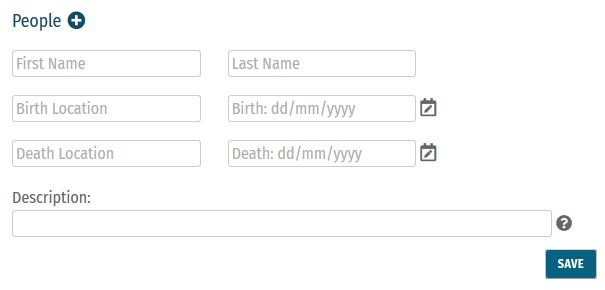 People:
People:People mentioned as creators or subjects in the item can also be tagged. Depending on the information you might have, you can enter the person’s first and last names, as well as their dates of birth and death. There is also the option to write a short description of the person, explaining who they are or their relevance to the item, e.g. the person’s occupation or their relation to another tagged person.
Multiple people can be tagged to one item.
Once you have finished your person tag, click SAVE.
 Keywords:
Keywords:Here, you can freely add keywords related to the topic and content of the item. This could include particular themes (e.g. art, music, war), subjects (e.g. children, cooking, France), or particular historical affiliations (e.g. 20th century, Austro-Hungarian Empire, Fall of the Iron Curtain).
Multiple keywords can be added and they can be written in any language.
Write your keyword tag into the field and click SAVE.
 Other Sources:
Other Sources:External websites with information about the item’s content can be linked here. This could include links to further data about a person mentioned, a particular historical event or links to digital versions of newspapers that appear in photos or clippings in a notebook.
To add a link, click the plus next to the heading ‘Other Sources’. Enter the URL into the Link field, and write a short description of this link in the Additional Description field.
Multiple links can be tagged to one item.
Once you have finished your tag, click SAVE.
Step 5: Mark for Review
Once you have saved your contribution, the task will automatically change to the Edit status. If you think the task is finished, you can mark it for review. Note that you have to be at Runner level or above to do this (see: Miles and Levels). Click on the yellow circle next to the section heading and select Review in the list that appears. The task now needs to go under Review by another volunteer.Formatting
Review
 All enrichments need to be edited and reviewed by more than one volunteer to ensure that they are as accurate as possible.
Only Sprinters and Champions can edit tasks in the Review stage and mark them as Complete. (see: Miles and Levels)
You can review a task (Transcription, Description, Locations, or Tagging) when the circle next to the heading is coloured orange .
During the review process, pay close attention to the following requirements:
All enrichments need to be edited and reviewed by more than one volunteer to ensure that they are as accurate as possible.
Only Sprinters and Champions can edit tasks in the Review stage and mark them as Complete. (see: Miles and Levels)
You can review a task (Transcription, Description, Locations, or Tagging) when the circle next to the heading is coloured orange .
During the review process, pay close attention to the following requirements:
-
- Transcription: The complete text in the item has been properly transcribed and the transcription is formatted as accurately as possible. The correct language(s) are selected and the transcription contains no missing or unclear icons.
-
- Description: The description is accurate and detailed (especially items without text to transcribe, e.g. photos), and the appropriate categories have been ticked.
-
- Location(s): All locations have been correctly tagged. The location name is accurate and matches the coordinates and the pin on the map. The description is clear and concise, and the Wikidata reference (if any) is correct.
-
- Tagging: Document dates are completed and as precise as possible. All mentioned people are tagged and their data is correct. All added keywords are applicable to the item, and other sources have accurate information and functioning links.
Completion Statuses
| GREY |
| 1. NOT STARTED |
| Tasks have not been started. |
| YELLOW |
| 2. EDIT MODE |
| Tasks have been started, but not yet finished. Additions and edits can still be made. |
| ORANGE |
| 3. REVIEW |
| Tasks are finished, but need final review by Sprinter or Champion transcribers. |
| GREEN |
| 4. COMPLETED |
| Tasks have been fully completed and reviewed. No further changes need to be made. |
Miles and Levels
Transcribathon is a competitive marathon. You do not enrich documents alone, but compete and work with other volunteers to ensure the quality of your work. When you first create a Transcribathon account, you only have the ability to start and edit tasks. The more you enrich documents, the closer you become to advancing to a higher level, which can unlock abilities like reviewing and completing tasks.| Level | Abilities |
|---|---|
| Trainee | Basic abilities: start and edit tasks |
| Runner | Basic abilities, mark finished tasks for review |
| Sprinter | All Runner abilities, mark reviewed annotations as completed |
| Champion | All Sprinter abilities, mark reviewed transcriptions as completed |
| Tasks | Miles Received |
|---|---|
| Transcription | 1 Mile for every 300 characters transcribed |
| Description | 1 Mile for every 5 Descriptions added |
| Location | 1 Mile for every 5 Locations added |
| Tagging | 1 Mile for every 5 Tags added |
| Reviewing | 1 Mile for every 10 items marked as complete |
